The global automotive seat climate systems market size was valued at $4.2 billion in 2022, and is projected to reach $6.9 billion by 2032, growing at a CAGR of 5.3% from 2023 to 2032.
Report Key Highlights:
- The report covers a detailed analysis on the seat climate control systems in automotive industry.
- The automotive seat climate control system market has been analyzed from the year 2022 till the year 2032.
- Latest developments have been mentioned in the research study.
- Top companies operating in the industry has been profiled in the research study.
- The research study includes different segments & regions across which the market has been analyzed.
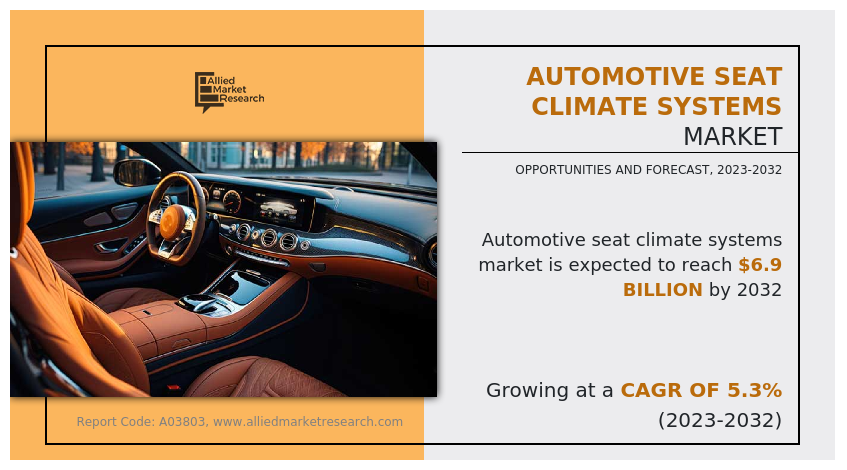
The automotive seat climate control systems maintain the interior temperature of the vehicle. Passengers can easily choose their desired temperature setting, and the system automatically regulates the blower speed and adjusts the air vents. The system's electronic control continuously monitors various factors, such as the sun's position and the external temperature, and adjusts the cooling output accordingly. By integrating the control unit into the CAN data bus, additional features can be incorporated. For instance, the system can automatically switch to air recirculation mode when the windshield is being washed, preventing any undesirable odors from entering the car.
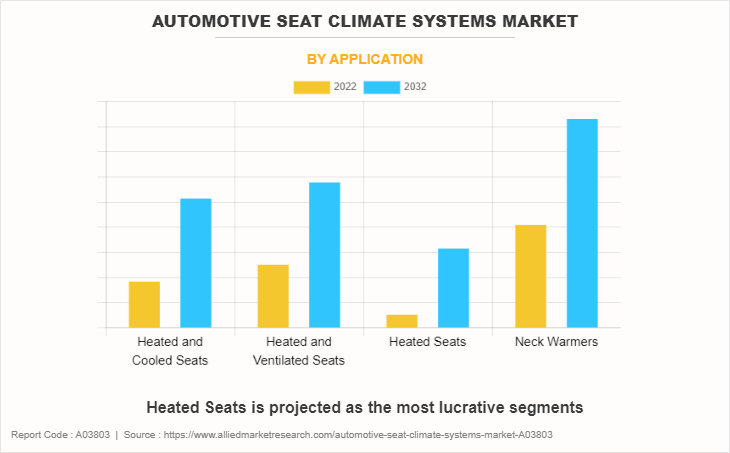
Automotive manufacturers are leveraging new technologies to bring luxury vehicles with enhanced comfort level. Moreover, there are opportunities for autonomous vehicles owing to the increased R&D activities with the increase in popularity of connected cars and the Internet of Things (IoT) are driving the automotive seat climate system market share. For instance, Audi, a prominent German automotive company specializing in luxury vehicles, reported a revenue increase of 16.4% in the fiscal year 2022, reaching a total revenue of $61.8 billion, according to official reports. While luxury cars are often expensive, the consumer base for such vehicles is steadily expanding for several reasons.
These include growing incomes in both developing and developed nations, as well as increased access to financial assistance, enabling more people to invest in luxury automobiles. This technology enables the occupants of the vehicle to select between heated seats and climate-controlled seats. The seats offer up to twelve different adjustment options, allowing them to be quickly tailored to the specific contours of each person's body. These custom adjustment settings can be conveniently saved in memory and easily retrieved whenever needed. These features are increasing demand for climate-controlled seats, positively impacting automotive seat climate system industry growth.
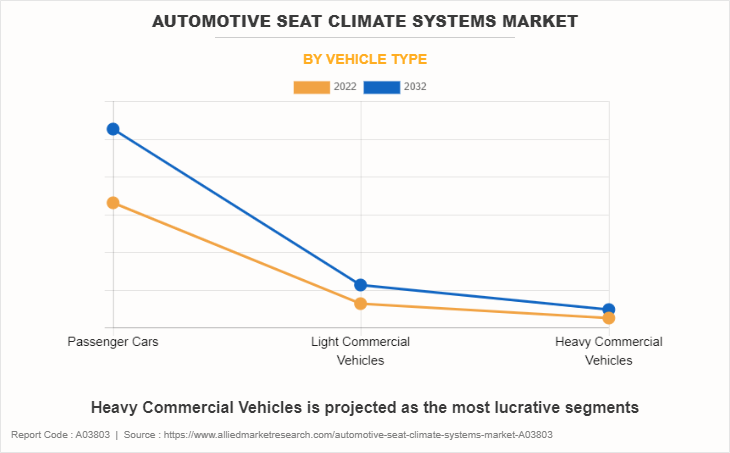
Increase in investment in luxury cars:
The global automotive seat climate systems market is witnessing significant growth due to rising investments in the luxury and high-end car segments. These premium vehicles are equipped with a range of top-tier features, including seat heaters, which have become a standard offering for automotive manufacturers. For instance, Audi, a prominent German automotive company specializing in luxury vehicles, reported a revenue increase of 16.4% in the fiscal year 2022, reaching a total revenue of $61.8 billion, according to official reports. While luxury cars are often expensive, the consumer base for such vehicles is steadily expanding for several reasons. These include growing incomes in both developing and developed nations, as well as increased access to financial assistance, enabling more people to invest in luxury automobiles.
This technology enables the occupants of the vehicle to select between heated seats and climate-controlled seats. The seats offer up to twelve different adjustment options, allowing them to be quickly tailored to the specific contours of each person's body. These custom adjustment settings can be conveniently saved in memory and easily retrieved whenever needed. These features are increasing demand for climate-controlled seats, positively impacting market growth.
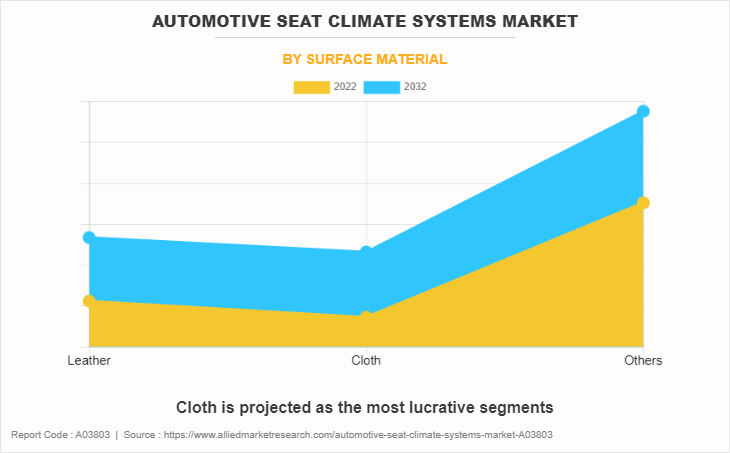
Increase in comfort level for the drivers
Seat climate control is gaining prominence as it offers multi-zone climate control inside the car. Automatic climate control stands as one of the most cutting-edge systems for independently managing the temperature within a vehicle's cabin, regardless of external conditions. Due to this, the drivers inside the car can set and maintain their preferred cabin temperature and humidity level, which provides them with ease of driving.
This technology efficiently governs airflow, air distribution, and cabin temperature, providing a customized and comfortable climate for all passengers. In addition to these functions, the automatic climate control system also oversees air circulation and fan speed to optimize the in-cabin environment. This technology enables both the driver and the front passenger to independently set their desired temperature levels for their respective sides. The automatic climate control system, coupled with a responsive sensor system, ensures that these chosen temperatures are consistently maintained without requiring any manual interventions.
Availability is limited to premium cars.
The seat climate system technology is limited to only premium cars, due to which it is difficult for the mid-level income population to afford it.
The elevated maintenance and installation expenses associated with climate-controlled seats are a significant impediment to their widespread adoption, primarily in luxury vehicles. Moreover, post-purchase servicing costs are also on the higher side. These seats are typically factory-installed only in the driver's seat, requiring passengers to incur additional charges for installation in other seats.
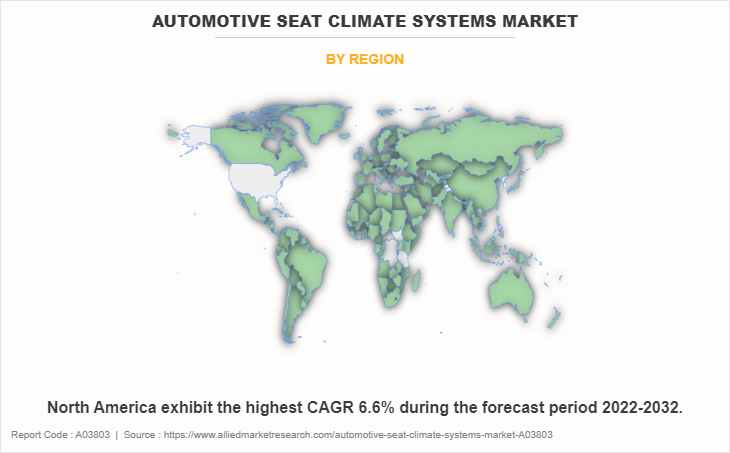
Technological advancements in the automotive industry
The ongoing innovations in the automotive industry are anticipated to revolutionize the seats deployed in cars, making them more comfortable and impacting market growth positively.
The automotive manufacturers are focusing on innovations such as moisture-sensing seat technology and liquid-cooled and heated seats, among others. For instance, Ford is focusing on moisture-sensing seat technology to regulate climate control using liquid-permeable seat covers. Moreover, cooled seats employ various techniques to ensure the comfort of seat occupants by maintaining an agreeable temperature. All these factors are anticipated to drive market growth in the forecast period.
Key Benefits For Stakeholders
- This report provides a quantitative analysis of the market segments, current trends, estimations, and dynamics of the automotive seat climate systems market analysis from 2022 to 2032 to identify the prevailing automotive seat climate systems market opportunities.
- The market research is offered along with information related to key drivers, restraints, and opportunities.
- Porter's five forces analysis highlights the potency of buyers and suppliers to enable stakeholders make profit-oriented business decisions and strengthen their supplier-buyer network.
- In-depth analysis of the automotive seat climate systems market segmentation assists to determine the prevailing market opportunities.
- Major countries in each region are mapped according to their revenue contribution to the global market.
- Market player positioning facilitates benchmarking and provides a clear understanding of the present position of the market players.
- The report includes the analysis of the regional as well as global automotive seat climate systems market trends, key players, market segments, application areas, and market growth strategies.
Automotive Seat Climate Systems Market Report Highlights
| Aspects | Details |
| Market Size By 2032 | USD 6.9 billion |
| Growth Rate | CAGR of 5.3% |
| Forecast period | 2022 - 2032 |
| Report Pages | 341 |
| By Application |
|
| By Vehicle Type |
|
| By Surface Material |
|
| By Region |
|
| Key Market Players | Continental AG, Ford Motor Company, Renault Group, Volkswagen Group, Tesla, Inc., AB Volvo, Jaguar Land Rover Limited, BMW AG, Mercedes-Benz AG, Hyundai Motor Group |
Analyst Review
The global automotive seat climate systems market is expected to witness high growth rate, owing to increased driver comfort during long journeys, rise in penetration of semi-luxury and luxury vehicles worldwide, growth in disposable income of the population, high fuel efficiency, and lower electric power consumption. However, high installation cost of automotive climate seats impedes the market growth.
An automotive seat climate system is a technology that helps to heat or cool the seats according to the surrounding environment, for instance, heating in cold temperature and cooling the seats in tropical and hot environments. Such seats provide optimum comfort and geometric flexibility to the driver and co-passengers during a long journey.
The heated & ventilated seats and heated & cooled seats segments of the automotive seat climate systems market have higher potential for growth in the global market. The market is consolidated by the presence of major seat manufacturers who account for a significant share of the market. Being a high capital-intensive market, the threat from new entrants is minimum. Surge in adoption of comfort combined with safety in vehicles and government rules and regulations for fuel efficiency augment the market growth in North America, Europe, and Asia-Pacific. In addition, reduction in the cost of manufacturing technical products and rapid technological modernization are projected to boost the market growth in near future.
Lear Corporation, Gentherm, Konsberg Automotive, Adient plc, Continental AG, Magna International Inc., II-VI, Inc., Toyota Motor Corporation, Recticel, and Faurecia are key market players that occupy a significant revenue share in the global automotive seat climate systems market.
Heated And Cooled Seats are the upcoming trends of Automotive Seat Climate Systems Market.
Heated And Cooled Seats, Heated And Ventilated Seats, Heated Seats, Neck Warmers are the application of Automotive Seat Climate Systems Market.
North America is the largest regional market for Automotive Seat Climate Systems.
The global Automotive Seat Climate Systems Market is projected to be valued at $ 4177.8 million in 2025, and is expected to reach $ 6859.2 million by 2035, registering a CAGR of 5.3% from 2022 to 2032.
Key players operating in the global automotive seat climate systems market are Mercedes-Benz AG, Ford Motor Company, Volkswagen Group, BMW AG, Audi AG, AB Volvo, Continental AG, Jaguar Land Rover Limited, Tesla, Inc., and Hyundai Motor Company, among others. The leading companies adopt strategies such as product launch, partnership, acquisition, expansion and collaboration to strengthen their market position.
Loading Table Of Content...
Loading Research Methodology...



